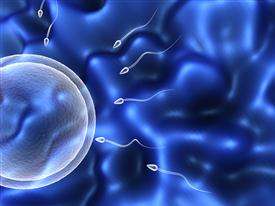Can environmental contaminants cause lower sperm count?

The amount of perfluorooctanoic acid (PFOA) that mothers had in their blood during pregnancy affected their sons' semen quality at 20 years old. These findings appear in a recent study from Aarhus University Hospital, Denmark, in which the Norwegian Institute of Public Health participated.
Researchers had proposed hypotheses that increasing exposure to hormone-disrupting substances in the environment may be a contributory factor to reduced sperm quality. Therefore this study was initiated and found the following:
- The sons of mothers with the highest concentrations of PFOA in the blood during pregnancy had a lower sperm concentration and total sperm count than the sons of mothers with the lowest PFOA levels.
- A positive association was also found between PFOA exposure before birth and elevated levels of luteinising hormone (LH) and follicle stimulating hormone (FSH) in the sons' blood.
"The study indicates that exposure to these contaminants in foetal life may have significance for decreased semen quality in adulthood. However, this remains to be confirmed by similar studies," say the researchers. Levels of PFOA and other persistent perfluorinated compounds in Norway in the late 1980s were very similar to the Danish study, which makes the findings relevant for Norway.
"Levels of several of these contaminants in Norwegian women's blood have decreased significantly since 2000. It is nevertheless important to mention that this is not the case for all substances and that we should try to limit our exposure to persistent substances to reduce the risk of adverse health effects," say the researchers.
About the study
In 1988-1989, about 1,000 pregnant women in Aarhus, Denmark were recruited for a study where a blood sample from each was collected and frozen in week 30 of pregnancy. In 2008-2009, their sons were contacted and asked if they wanted to participate in a follow-up study.
Approximately 170 of the sons (19-21 years old) agreed to participate and donated a blood sample and a semen sample. The amount of perfluorinated alkyl substances (PFAS) in the mothers' blood during pregnancy was analysed by the Norwegian Institute of Public Health and compared with the sons' sperm concentration, total sperm count and sex hormone levels.
The researchers chose to measure the exposure during foetal life, because the effect on the development of the sex organs during this period may have consequences later in life.
More information: Vested, A. et al. Associations of in utero exposure to perfluorinated alkyl acids with human semen quality and reproductive hormones in adult men. Environmental Health Perspectives, doi:10.1289/ehp.1205118
















